Published at Long Last!
January 10, 2024 § Leave a comment
Katherine D. Harris and I started working on what would become chapter 6, “Why (in the World) Teach Digital Humanities at a Teaching-Intensive Institution?” before the pandemic, and I met with Brian Croxall at the MLA Conference in Seattle in January 2020 to discuss our first version. That was my last travel before everything shutdown. So, I was delighted–at last–to receive this book as an early Christmas present from University of Minnesota Press. It was a pleasure, as always, to collaborate with Katherine on this publication. Thanks, Kathy! I’m looking forward to reading the rest of it, and a big thank you to Croxall and Jakacki for seeing it through!
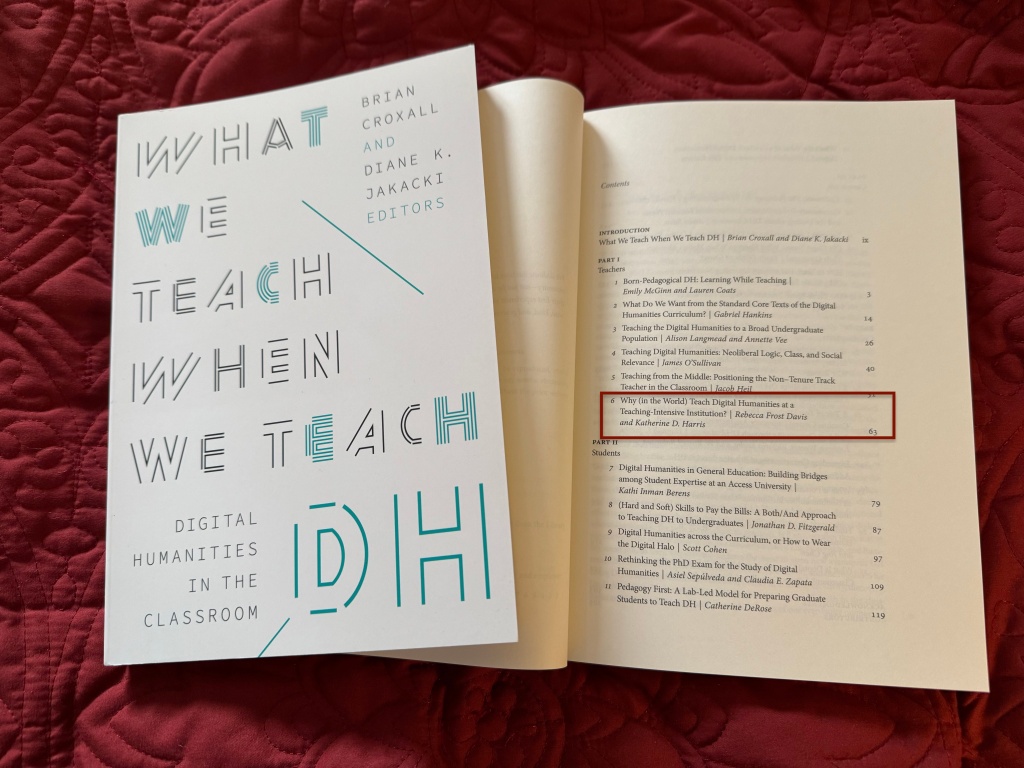
What We Teach When We Teach DH
Digital Humanities in the Classroom, edited by Brian Croxall and Diane K. Jakacki, University of Minnesota Press, 2023. As the press overview describes it: “Exploring how digital humanities (DH) is taught and what that reveals about the field, this book highlights how DH can transform learning across a vast array of curricular structures, institutions, and education levels, from high schools and small liberal arts colleges to research-intensive institutions and postgraduate professional development programs.”
Honorable Mention for Top Book in Second Language Learning and Teaching
January 6, 2024 § Leave a comment
I’m delighted that a book to which I contributed was named Honorable Mention for the Mildenberger Prize, an award given by the MLA for the top book in second language learning and teaching. The book, Open Education and Second Language Learning and Teaching: The Rise of a New
Knowledge Ecology, was co-edited by Carl S. Blyth, associate professor of French linguistics at the University of Texas, Austin, and Joshua J. Thoms, professor of applied linguistics and Spanish at Utah State University. The prize is awarded for an outstanding work in the fields of language, culture, literacy, and literature with strong application to the teaching of languages other than English.
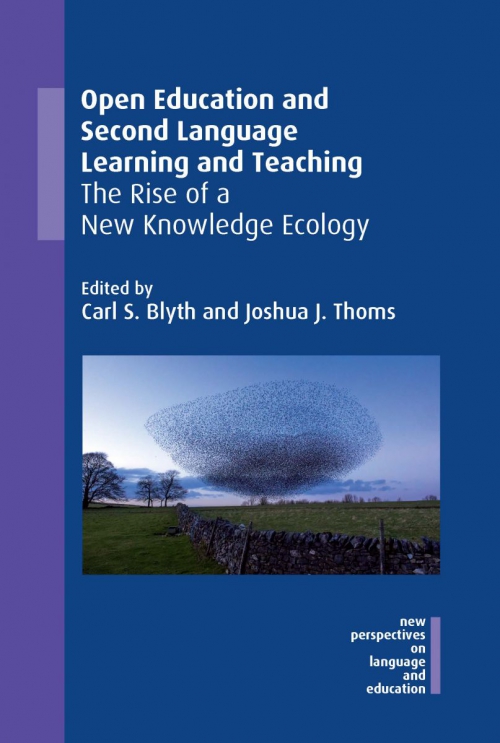
The committee’s citation for the honorable mention reads:
Open Education and Second Language Learning and Teaching: The Rise of a New
Knowledge Ecology operationalizes the open educational movement in the context of
language teaching and learning. A historical overview of the movement is supplemented
with a thorough exploration of the new knowledge ecologies it produces, particularly in
the world of language education in and beyond the classroom context. By combining
theory and practice with examples for a range of different languages, Carl S. Blyth and
Joshua J. Thoms’s book is relevant across many fields and for researchers as well as
educators.
I co-authored a chapter with Carl Blyth called, “Towards a Pedagogy of Openness: Bridging English-language and foreign-language Digital Humanities.” The book was released as open access and can be downloaded for free from here: https://www.multilingual-matters.com/page/detail/?k=9781800411005
The prize went to Leaver, Davidson & Campbell (eds) for Transformative language Learning and Teaching (Cambridge U Press). Read the full press release here: Krebs, Paula M. BETTY LOU LEAVER, DAN E. DAVIDSON, AND CHRISTINE CAMPBELL TO RECEIVE THE MLA’S KENNETH W. MILDENBERGER PRIZE FOR TRANSFORMATIVE LANGUAGE LEARNING AND TEACHING; CARL S. BLYTH AND JOSHUA J. THOMS TO RECEIVE HONORABLE MENTION. Modern Language Association, 6 Dec. 2023, )
Network+Publication+Ecosystem: Curating Digital Pedagogy, Fostering Community
June 12, 2023 § Leave a comment
I’m delighted to announce the publication of “Network+Publication+Ecosystem: Curating Digital Pedagogy, Fostering Community” in the latest issue of Interdisciplinary Digital Engagement in Arts & Humanities (IDEAH), “a peer-reviewed, online, open access journal committed to publishing digital humanities research, as it is most broadly and inclusively defined, including work in fields such as media studies, scholarly communication, digital public humanities, textual studies, digital pedagogy, and beyond.” This article considers how the project, Digital Pedagogy in the Humanities (DPiH), which was published on the Humanities Commons in 2020 by the Modern Language Association, “in its design and implementation, challenges existing ideas about scholarship, pedagogy, and our shared ecosystem of scholarly communication.”
Thanks to Matthew K. Gold and Katherine D. Harris–it was a pleasure to write with you again! And thanks, especially to our editors, Laura Estill, Constance Crompton, and Ray Siemens for your work in shepherding this latest issue of IDEAH, and organizing the conference, Open/Social/Digital Humanities Pedagogy, Training, and Mentorship in June 2021, where we first presented on this topic. I encourage you to take a look at the whole issue, which offers great insight into digital humanities pedagogy.
And, here’s how to cite our chapter:
Davis, Rebecca Frost, Mathew K. Gold, and Katherine D. Harris. “Network + Publication + Ecosystem: Curating Digital Pedagogy, Fostering Community.” IDEAH, June 2023. ideah.pubpub.org, https://doi.org/10.21428/f1f23564.57d0b002.
Writing My Course Policy for Generative AI
May 10, 2023 § 1 Comment
I’m teaching DLHE 7305: Introduction to Digital Learning Environments, a course in the Doctorate of Education in Leadership and Higher Education at St. Edward’s University for the fifth time in Summer 2023. Last time was Fall 2021 which was before the hype of Generative AI. So, last Friday before I published my Canvas course, I knew I needed to add a statement about the use of Generative AI in my class. Thanks to this resource, Classroom Policies for AI Generative Tools, created by Lance Eaton, I had plenty of models that allowed me to leapfrog forward in the creation of my own policy.
I’m creating this post to share what I came up with, the models I used in creating it, and why.
Statement:
Generative Artificial Intelligence (AI) Tools
You may use generative AI programs, e.g. ChatGPT, to help generate ideas and brainstorm. You should note, however, that the material generated by these programs may be inaccurate, incomplete, biased or otherwise problematic. Beware that use may also stifle your own independent thinking and creativity.
Generative AI also derives its output from previously created texts from other sources that the models were trained on, yet doesn’t cite sources. You may not submit any work generated by an AI program as your own. If you include material generated by an AI program, it should be cited like any other reference material (with due consideration for the quality of the reference, which may be poor). When/if you use Artificial Intelligence (AI) platforms in your assignments, please write a note to clarify where in your process you used AI and which platform(s) you used. See this article for proper APA formatting of such citations: How to cite ChatGPT
Models and Motivation
I specifically modeled my statement on three policies I found among the Classroom Policies for AI Generative Tools, #6 by Holly Fernandez-Lynch, #9 by Spencer Ross and #15 by Maha Bali. I liked #6 because it allowed for the use of AI programs, wasn’t too long, and included a warning about the output. (It didn’t hurt that Penn is my alma mater, so that one had caught my attention.) My class is about looking at technologies with a critical eye and being a critical user of technology, so this one strikes the right tone to reinforce the story of my course. I pulled from #9 for elaboration on the problems with uncited material in AI to add support for citing sources, then added a pointer to the APA model for citing ChatGPT, since that is the style guide my students must follow in this program.
Finally, I liked the transparency approach framed by Maha Bali–the idea of adding a note to explain working process. I believe that my students will need to use generative AI to become more productive if they want to compete, and reflecting on process needs to be part of that learning. I’m doing a little of that reflection right now. When I added my own policy to the growing list of models, I had to go back and find the ones I had used so I could acknowledge them. (I have to admit I was looking at policies more than people the first time I reviewed these models, but I’m not surprised that I ended up using one created by Maha.) And, while we are talking citations, this is a good time to say, feel free to use my policy under a Creative Commons Attribution 4.0 International License (CC BY 4.0)
Franklin Pierce: Educating Problem-Solvers for Our Emerging Digital Ecosystem
October 30, 2020 § Leave a comment
I’m speaking to the IDEAL faculty cohort at Franklin Pierce University this afternoon. Here is an abstract of the talk:
Educating Problem-Solvers for Our Emerging Digital Ecosystem
What skills, abilities, and habits of mind do today’s graduates need to navigate and solve complex problems in a constantly changing, globally-connected world? How can we integrate digital skills in support of critical thinking and inquiry across the curriculum? The future of higher education depends upon a model of digitally-informed learning that is not merely content delivery online but rather is education reshaped in the same ways that digital technologies have already fundamentally changed our culture. This talk will present a vision for building an integrated curriculum that fosters self-directed, digitally-augmented problem-solving from introductory to capstone level courses and prepares graduates to partner with technology to solve problems.
Slides
References
Anne Fisher. “Are You Ready for the Rise of ‘Hybrid’ Jobs?” Fortune, Mar. 2019, http://fortune.com/2019/03/21/hybrid-jobs-purple-squirrels/.
Austin Travis County COVID-19 Public Dashboard. https://austin.maps.arcgis.com/apps/opsdashboard/index.html#/39e4f8d4acb0433baae6d15a931fa984. Accessed 30 Oct. 2020.
Ayers, Edward L. “Does Digital Scholarship Have a Future?” EDUCAUSE Review, vol. 48, no. 4, Aug. 2013, http://er.educause.edu/articles/2013/8/does-digital-scholarship-have-a-future.
Bass, Randy, and Bret Eynon. Open and Integrative: Designing Liberal Education for the New Digital Ecosystem. Association of American Colleges and Universities, 16 June 2016, https://www.aacu.org/publications-research/publications/open-and-integrative-designing-liberal-education-new-digital.
Chang, Jonas, and Kodey Springate. About the Authors – McDonald Territory, 2017, http://divided.coplacdigital.org/truman/about-the-project/about-the-authors/. Accessed 3 Sept. 2018.
—. “About The Project – McDonald Territory.” McDonald Territory, 2017, http://divided.coplacdigital.org/truman/about-the-project/.
—. McDonald Territory – Seeking Recognition in Twentieth Century Missouri. 2017, http://divided.coplacdigital.org/truman/.
—. COPLACDigital: Digital Liberal Arts and the Power of a Consortium. https://www.aacu.org/AM18/Resources. 2018 Annual Meeting of the Association of American Colleges and Universities, Washington D.C.
COVID-19 Dashboard | St. Edward’s University in Austin, Texas. https://www.stedwards.edu/healthy-hilltop/covid-19-dashboard. Accessed 30 Oct. 2020.
Davis, Rebecca Frost. “Reflections on a Text Analysis Assignment.” Rebecca Frost Davis: Liberal Education in a Networked World, https://rebeccafrostdavis.wordpress.com/. Accessed 11 Dec. 2013.
Davis, Rebecca Frost, Matthew K. Gold, and Katherine D. Harris. “Curating Digital Pedagogy in the Humanities.” Digital Pedagogy in the Humanities: Concepts, Models, and Experiments, edited by Rebecca Frost Davis, Matthew K. Gold, Katherine D. Harris, and Jentery Sayers, Modern Language Association, 2020, https://digitalpedagogy.hcommons.org/introduction/.
Davis, Rebecca Frost, Matthew K. Gold, Katherine D. Harris, and Jentery Sayers, editors. Digital Pedagogy in the Humanities: Concepts, Models, and Experiments. Modern Language Association, 2020, https://digitalpedagogy.hcommons.org/.
Dunn, Mary B. “Early Career Developmental Networks and Professionals’ Knowledge Creation.” Journal of Management, Apr. 2017, p. 0149206317702218. SAGE Journals, doi:10.1177/0149206317702218.
—. “Using Social Network Analysis in the Classroom: An Experiential Activity and Tool to Enhance a Sense of Community.” Management Teaching Review, Sept. 2018, p. 2379298118796600. SAGE Journals, doi:10.1177/2379298118796600.
Hypothesis, https://web.hypothes.is/. Accessed 30 Oct. 2020.
Espinosa, Robert. Travis County Clerk – Wait Time Map. https://countyclerk.traviscountytx.gov/elections/wait-time-map.html. Accessed 30 Oct. 2020.
Farman, Jason. “Digital Diversity Syllabus.” Digital Pedagogy in the Humanities: Concepts, Models, and Experiments, edited by Rebecca Frost Davis, Matthew K. Gold, Katherine D. Harris, and Jentery Sayers, Modern Language Association, 2020, https://digitalpedagogy.hcommons.org/keyword/Digital%20Divides#digital-diversity-syllabus.
“The GEMS Design Principles for General Education.” General Education Maps and Markers: Designing Meaningful Pathways to Student Achievement, AAC&U, 2015, https://www.aacu.org/sites/default/files/files/gems/gmsge_p3_designprinciples_flier.pdf.
“General Education Maps and Markers (GEMs).” Association of American Colleges & Universities, 26 Nov. 2013, https://www.aacu.org/gems.
Grandjean, Martin. “A Social Network Analysis of Twitter: Mapping the Digital Humanities Community.” Cogent Arts & Humanities, vol. 3, no. 1, Apr. 2016, doi:10.1080/23311983.2016.1171458.
“INaturalist.” INaturalist, https://www.inaturalist.org/. Accessed 30 Oct. 2020.
Jenkins, Henry. Confronting the Challenges of Participatory Culture: Media Education for the 21st Century. MIT Press, 2009, https://mitpress.mit.edu/books/confronting-challenges-participatory-culture.
Kalir, Remi. An Annotation Flash Mob Invitation. 24 Apr. 2016, https://gamesandlearning.wordpress.com/2016/04/24/an-annotation-flash-mob-invitation/.
Levy, Frank, and Richard Murnane. Dancing with Robots: Human Skills for Computerized Work. third way, 2013, http://www.thirdway.org/publications/714.
Lorenz, Taylor, et al. “TikTok Teens and K-Pop Stans Say They Sank Trump Rally.” The New York Times, 14 Sept. 2020. NYTimes.com, https://www.nytimes.com/2020/06/21/style/tiktok-trump-rally-tulsa.html.
Markow, Will, et al. New Foundational Skills of the Digital Economy. Burning Glass Technologies & Business-Higher Education Forum, 2018, https://www.burning-glass.com/research-project/new-foundational-skills/.
“Observations.” Wild Basin Biodiversity Project. INaturalist, https://www.inaturalist.org/observations?project_id=1382. Accessed 30 Oct. 2020.
@SaeedDiCaprio. “Hurt CoPain on Twitter.” Twitter, 1 June 2020, https://twitter.com/SaeedDiCaprio/status/1267505059333627904.
Taub, Lora. Department of Media and Communication Storymapping Project. http://storymapping.blogs.muhlenberg.edu/. Accessed 19 Mar. 2015.
“TikTok.” Wikipedia, 25 Oct. 2020. Wikipedia, https://en.wikipedia.org/w/index.php?title=TikTok&oldid=985388440.
Wasserman, Michael. Incorporating Personal Health Devices Into Environmental Science and Global Studies Courses in Angers, France: Understanding the Influence of Culture and Environment on Human Health. 2015, http://sites.stedwards.edu/tltr/pilot-projects/2015-pilot-projects/.
“Wikistorming.” Digital Pedagogy in the Humanities: Concepts, Models, and Experiments, edited by Rebecca Frost Davis, Matthew K. Gold, Katherine D. Harris, and Jentery Sayers, Modern Language Association, 2020, https://digitalpedagogy.hcommons.org/keyword/Affect#wikistorming.
My Remarks for Mark Up the Margin 2020
June 12, 2020 § Leave a comment
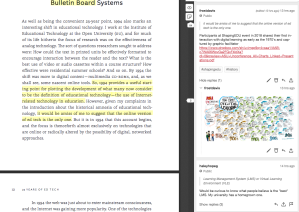
Workshop Participants Annotating
This morning I joined the AnnotatED community sponsored by the Hypothes.is social annotation tool for a pre-conference workshop called “Mark Up the Margin” before the OLC Innovate conference. We also engaged in a live group annotation of “The Historical Amnesia of Ed Tech” the introduction to OLC Innovate 2020 keynoter Martin Weller‘s book 25 Years of Ed Tech (seen at the left). In this post, I am sharing my remarks on my experiences so far with the St. Edward’s University pilot of the new Hypothes.is Canvas plug-in, as well as the directions for one of my annotation assignments. « Read the rest of this entry »
Digital Pedagogy in the Humanities is now available in beta form
April 18, 2020 § Leave a comment
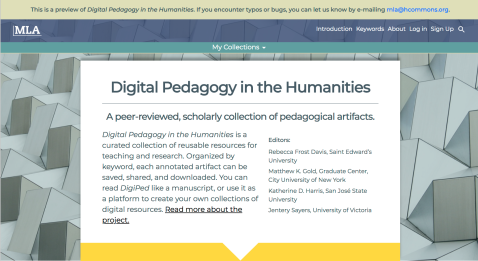 Digital Pedagogy in the Humanities has emerged on its Modern Language Association (MLA) platform in a beta form and is being corrected live through June 2020. In light of the widespread move to online education at most universities due to the COVID-19 pandemic, both the MLA staff and editors Davis, Gold, and Harris agreed that opening up the project in its post-peer review, copyedited state would be beneficial for everyone. Please join us in welcoming this long-standing project (begun back in 2012) in its final platform into the world: Digital Pedagogy in the Humanities
Digital Pedagogy in the Humanities has emerged on its Modern Language Association (MLA) platform in a beta form and is being corrected live through June 2020. In light of the widespread move to online education at most universities due to the COVID-19 pandemic, both the MLA staff and editors Davis, Gold, and Harris agreed that opening up the project in its post-peer review, copyedited state would be beneficial for everyone. Please join us in welcoming this long-standing project (begun back in 2012) in its final platform into the world: Digital Pedagogy in the Humanities
Thanks to my fellow editors, Matthew K. Gold, Katherine D. Harris, and Jentery Sayers for collaborating on creating and developing this project and to the 84 curators and 891 artifact creators for sharing their pedagogy with the world!
Seton Hall University: Educating Problem-Solvers for Our Emerging Digital Ecosystem
April 12, 2019 § 1 Comment
Friday, April 12, 2019 I had the pleasure of speaking and leading a workshop at Seton Hall University. Although I covered a topic I have done in previous presentations, e.g., last year at Endicott College, I integrated new material, including new examples from Digital Pedagogy in the Humanities (forthcoming from MLA in 2019!) as well as from recent conferences, and the report on New Foundational Skills for the Digital Economy. See below for the description, slides, and references.
Description
What skills, abilities, and habits of mind do today’s graduates need to navigate and solve complex problems in a constantly changing, globally-connected world? How can we integrate digital skills in support of critical thinking and inquiry across the curriculum . The future of higher education depends upon a model of digitally-informed learning that is not merely content delivery online but rather is education reshaped in the same ways that digital technologies have already fundamentally changed our culture. This talk will present a vision for building an integrated curriculum that fosters self-directed, digitally-augmented problem-solving from introductory to capstone level courses and prepares graduates to partner with technology to solve problems.
Slides
References
(in order of appearance)
Emerging Digital Ecosystem
Brenda Adrian, Ling-Hui Chen, Rebecca Davis, Loren Gamez, Joana Trimble Gándara, Laura Lucas, Tate Seroczynski. 2018 Freshman Technology Survey Infographics. Austin, TX: St. Edward’s University. 2018. Available here: http://sites.stedwards.edu/instructionaltechnology/2018/08/23/are-incoming-freshmen-digital-learners/
Rebecca Frost Davis, Matthew K. Gold, Katherine D. Harris, and Jentery Sayers, eds. Digital Pedagogy in the Humanities: Concepts, Models, and Experiments, 2017. https://github.com/curateteaching/digitalpedagogy
Minecraft: https://minecraft.net/
Eddie Makuch. “Minecraft Passes 100 Million Registered Users, 14.3 Million Sales on PC.” GameSpot, February 26,2014. http://www.gamespot.com/articles/minecraft-passes-100-million-registered-users-14-3-million-sales-on-pc/1100-6417972/.
Jenkins, Henry. Confronting the Challenges of Participatory Culture: Media Education for the 21st Century. John D. and Catherine T. MacArthur Foundation Reports on Digital Media and Learning. Cambridge, MA: MIT Press, 2009. http://digitallearning.macfound.org/atf/cf/%7B7E45C7E0-A3E0-4B89-AC9C-E807E1B0AE4E%7D/JENKINS_WHITE_PAPER.PDF.
General Education Maps and Markers (GEMs): http://www.aacu.org/gems
General Education Maps and Markers: Designing Meaningful Pathways to Student Achievement.” Association of American Colleges and Universities (AAC&U), 2014.
Bass, Randy, and Bret Eynon. “Open and Integrative: Designing Liberal Education for the New Digital Ecosystem.” Association of American Colleges and Universities, June 16, 2016. https://www.aacu.org/publications-research/publications/open-and-integrative-designing-liberal-education-new-digital.
Cheryl Faux. “Generation Z: Connected From Birth.” 27 February 2015. http://www.jbchicago.com/generation-z-connected-from-birth/
Frank Levy, and Richard Murnane. Dancing with Robots: Human Skills for Computerized Work. third way, 2013. http://www.thirdway.org/publications/714. See especially chart on p. 18.
Signature Work
Hoy, Ariane, and Kathy Wolfe. “High-Impact Learning for Self and Society: Community-Engaged Signature Work.” Diversity & Democracy 19.4 (2016). https://www.aacu.org/diversitydemocracy/2016/fall/hoy
Minecrafted History: https://github.com/shawngraham/hist3812a
Scaffolding the Digital Curriculum
Julie Sievers. “Scaffolding Learning In (and Across) A Course.” Innovation Fellowship. 2015. Retrieved September 18, 2015, from http://sites.stedwards.edu/innovationfellowship/scaffolding-learning-in-and-across-a-course/
Classroom Salon: http://www.classroomsalon.com/
Holden, Remi. “About that Annotation Flash Mob.” 27 April 2016. Accessed 1 May 2016. https://gamesandlearning.wordpress.com/2016/04/27/about-that-annotation-flash-mob/
Rebecca Frost Davis. “Experiential Learning at Wild Basin.” Instructional Technology, March 18, 2014. http://sites.stedwards.edu/instructionaltechnology/2014/03/18/experiential-learning-at-wild-basin.
Rebecca Frost Davis. “Reflections on a Text Analysis Assignment.” Rebecca Frost Davis: Liberal Education in a Networked World, November 12, 2013. https://rebeccafrostdavis.wordpress.com/2013/11/12/reflections-on-a-text-analysis-assignment/.
Voyant Tools: https://voyant-tools.org/
Mike Wasserman, Assistant Professor, Environmental Science & Policy, “Incorporating Personal Health Devices Into Environmental Science and Global Studies Courses in Angers, France: Understanding the Influence of Culture and Environment on Human Health” http://sites.stedwards.edu/tltr/pilot-projects/2015-pilot-projects/
Farman, Jason. Digital Diversity Syllabus. http://www.jasonfarman.com/wsb3566636401/index.html
FemTechNet Wikistorming: https://femtechnet.org/docc/feminist-wiki-storming/
Storymapping at Muhlenberg: http://storymapping.blogs.muhlenberg.edu/
Educating Problem-Solvers for Our Emerging Digital Ecosystem
February 16, 2018 § 1 Comment
On Thursday, February 15, I spoke at Endicott College. Here I share the description, slides, and references.
Description
What skills, abilities, and habits of mind do today’s graduates need for their careers and to solve complex problems in a constantly changing, globally-connected world? How can we integrate digital skills in support of critical thinking and inquiry across the curriculum? The future of higher education depends upon an integrative vision of digitally-informed learning that is not merely content delivery online but rather is education reshaped in the same ways that digital technologies have already fundamentally changed our culture. This talk will present a vision for building a curriculum that develops self-directed, digitally-augmented problem-solving from introductory to capstone level courses and prepares graduates to partner with technology to solve problems.
Slides
Genesis of an Online General Education Capstone Course
February 12, 2018 § 1 Comment
On Friday, January 26, I presented at the annual meeting of the Association of American Colleges and Universities (AACU) along with Steve Greenlaw of Mary Washington University and Gretchen McKay of McDaniel College in a panel called, “High-Impact Educational Practices in the Online Classroom”. Mark Lieberman of Inside Higher Ed covered the session in an article, “Making an Impact in Online Courses”, published January 31, 2018. In another post, I include my section of the panel, including the introduction and my description of how I teach the general education Capstone course online at St. Edward’s University. In this post, let me clarify the genesis of the online version of this course.
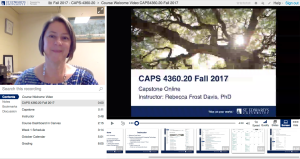
Welcome Video for Fall 2017 Capstone online, created in Panopto
The other two panelists discussed courses of their own design, but I described my experience as an adjunct instructor teaching a course designed by other faculty. In instructional design, we call these other faculty members, subject matter experts or SMEs (pronounced “smees”). I think this is an interesting case to describe because, especially for online courses, the model of adjunct instructors teaching a course designed by full time faculty is common. At the same time, this practice is not just a result of online delivery. Any course required to be taken by all students is likely to depend on this model of faculty content owner, with other instructors (whether full time or adjunct) charged with teaching other sections of the course. The case of the Capstone Course at St. Edward’s University provides a useful illustration. « Read the rest of this entry »
